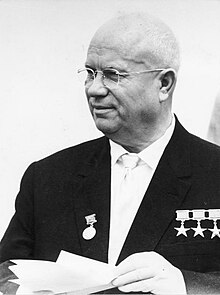
Wow. I recently encountered on twitter an idiot who was trying to argue that Hitler had created the Berlin Wall.
Actually, this was part of a broader discussion. Our idiot (OI for short) was trying to defend Trump's wall building. Somebody else had apparently mentioned the Berlin Wall as an example of the evils of building walls. OI apparently thought it important to make the point that Hitler had built a wall through the middle of his own capital, whereas Trump was dong things the right way, putting the wall on a border.
Then some other genius popped up and explained (???) that Stalin had actually built the Berlin Wall.
This was too much. Yours truly intervened and informed them that the Wall was constructed at the insistence of Nikita Khrushchev, isolating West Berlin from the eastern part of the city and the country of East Germany, when the latter was being run by a Khrushchev puppet, Walter Ulbricht.
I'm such a spoilsport.
But hey: if the Trumpets want to compare their hero to Nikita Khrushchev, I'm game. Please remember that NK's 'retirement' in '64 wasn't his own idea.
Some people are such idiots they lead one to see the point in social darwinism with fresh eyes....
Comments
Post a Comment